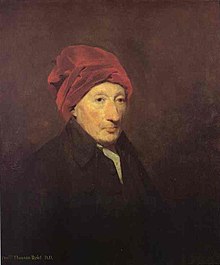Agent causation

Agent causation, or Agent causality, is a category of determination in metaphysics, where a being who is not an event—namely an agent—can cause events (particularly the agent's own actions). Agent causation contrasts with event causation, which occurs when an event causes another event.[1][2] Whether agent causation as a concept is logically sound is itself a topic of philosophical debate.[1]
Defenders of this theory include Thomas Reid and Roderick Chisholm. Reid believed that agents are the only beings who have a will, and considered having a will to be a necessary condition of being considered the cause of an event.[3]
Proponents
Thomas Reid is credited as the founder of the theory of agent causation.[4] In Essays on the Active Powers of Man (1788), Reid described an agent as one who has "power over the determinations of his own will."[5] He held that agents are the only beings who have a will, and considered having a will to be a necessary condition of being considered the cause of an event.[3]
Agent causation has been adopted by both compatibilists and incompatibilists alike.[1] Defending a compatibilist interpretation, Ned Markosian proposed a situation in which a person's actions, caused by nothing other than their own agency, have shaped their moral character over their lifetime to compel them to always do the right thing.[6] Roderick Chisholm's incompatibilist view contends that a free action is an action that originates from within the agent alone, not as the result of a prior event.[7] While still subject to debate, agent causation is generally considered to align with incompatibilist theory.[1]
Libertarians have offered agent causation as a defense of their incompatibilist belief that only undetermined, uncaused actions are free.[8] One objection to this belief argues that an undetermined action is one that occurs at random, and freedom does not follow from random, "by chance" action.[9] Agent causation counter-proposes the idea that an action need not be classified as either determined or random, but rather can occur under an agent's control.[10]
See also
References
- ^ a b c d "Agent Causation - Bibliography". PhilPapers. Retrieved 2016-11-23.
- ^ "Agent-Causality". informationphilosopher.com. Retrieved 2016-11-23.
- ^ a b Rowe, William L. (1991). "Responsibility, Agent-Causation, and Freedom: An Eighteenth-Century View". Ethics. 101 (2): 237–257. doi:10.1086/293287. ISSN 0014-1704. JSTOR 2381862. S2CID 145660090.
- ^ Nichols, Ryan; Yaffe, Gideon (2021), "Thomas Reid", in Zalta, Edward N. (ed.), The Stanford Encyclopedia of Philosophy (Summer 2021 ed.), Metaphysics Research Lab, Stanford University, retrieved 2021-09-21
- ^ Reid, Thomas (1788-01-01), Haakonssen, Knud; Harris, James A (eds.), "Essays on the Active Powers of Man", The Edinburgh Edition of Thomas Reid: Essays on the Active Powers of Man, Edinburgh University Press, p. 1, doi:10.1093/oseo/instance.00106526, ISBN 9780748617081, retrieved 2021-09-21
- ^ Markosian, Ned (September 1999). "A Compatibilist Version Of The Theory Of Agent Causation". Pacific Philosophical Quarterly. 80 (3): 257–277. doi:10.1111/1468-0114.00083. ISSN 0279-0750.
- ^ Feldman, Richard; Feldman, Fred (2021), "Roderick Chisholm", in Zalta, Edward N. (ed.), The Stanford Encyclopedia of Philosophy (Summer 2021 ed.), Metaphysics Research Lab, Stanford University, retrieved 2021-09-21
- ^ "Libertarianism". www.informationphilosopher.com. Retrieved 2021-09-28.
- ^ Goldman, Alvin I.; Nozick, Robert (January 1983). "Philosophical Explanations". The Philosophical Review. 92 (1): 81. doi:10.2307/2184523. JSTOR 2184523.
- ^ Pink, Thomas (2004). Free will : a very short introduction. Oxford: Oxford University Press. ISBN 978-0-19-151806-5. OCLC 77519071.
